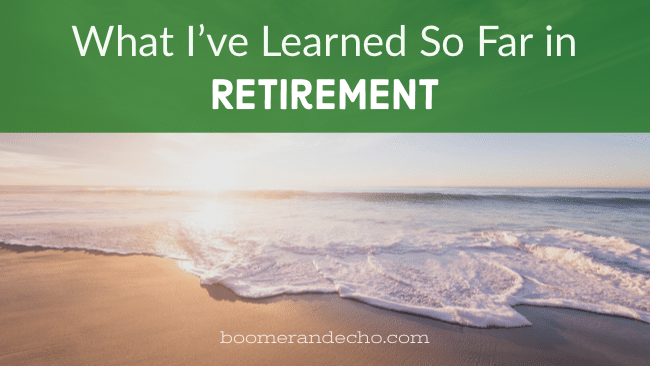Regular Hub guest blogger Robb Engen returned the favour earlier this week by inviting me to write a blog for his site Boomer & Echo. You can find that version by clicking on the highlighted headline: What I’ve learned so far in Retirement.
For convenience, it also appears below, including original links, with a Hub headline and a few subheadings that better reflect the central point that I personally don’t consider myself fully retired yet. This version has a few extra points added, plus two links to FIRE pieces that didn’t appear in the original B&E version. And as a bonus, it includes near the end an update on some of our recent travels, which hopefully reinforce some of the broader themes described in this blog.
Which begins as follows:
Through most of the five years the Financial Independence Hub has existed, Boomer & Echo’s Robb Engen has been kind enough to allow the “Hub” to republish some of his blogs that first appeared on his own site.
He recently suggested we turn the tables and invited me to write a guest blog for Boomer & Echo recounting some of the lessons I’ve learned in my decades as a financial writer and what I’ve learned so far in Retirement. Here it is.
For starters, my age alone qualifies me as a Boomer: I recently turned 66, but do not consider myself retired: at most, I consider myself semi-retired. As Robb would know, running a website is no trivial undertaking and I aim for new content 5 days a week, 52 weeks a year. That and writing for a handful of media outlets keeps me fairly occupied, although the privilege of doing this from home means I gain a couple of hours that would formerly have been expended on commuting.
Indeed my last full-time salaried staff job that involved commuting and bosses ended five years ago, when I stepped down from the editorship of MoneySensemagazine. That two-year stint followed 19 years at the National Post/Financial Post, most of which time I was the paper’s personal finance columnist.
Those familiar with my books or blogs would not expect me to describe myself as Retired, since my shtick has long been Financial Independence, or my contraction for it: Findependence. That’s as in Findependence Day, a financial novel I wrote in 2008 (Canadian edition) and 2013 (US edition.)
As I have often written, I do not regard the terms Retirement and Findependence as synonyms. You can be Findependent but not Retired, as I am; but it’s hard to be Retired if you’re not Findependent.
In the old days, the traditional “full-stop” retirement was considered to happen at age 65, which even today is when you can first start receiving Old Age Security benefits. (And yes, I do now collect OAS, for reasons I’ve explained elsewhere). But “Findependence Day” can be years or even decades earlier: you may still choose to work for money but on your terms: the magic day is when you’re completely free of debt and have enough saved (and properly invested) that even if you never earned another dime you could meet all your major living expenses, assuming some variant of the 4% Rule.
Even if I considered myself as having “retired” at age 61, that’s relatively old by the standards of the so-called FIRE movement, which of course stands for Financial Independence Retire Early. True FIRE people aspire to “retire” in their 30s or 40s, sometimes even in their 20s, typically by saving like demons for a decade or so: in the most extreme cases they may save something like 50% of their income.
I’m more like Robb, where he described in his blog why he wasn’t yet paying down his mortgage because he first wanted to maximize RRSP and TFSA savings. Mind you, my books do argue that “the foundation of financial independence is a paid-for home” but I’m old school and we bought our first home (of only two) back in the 1980s, when Toronto real estate was pricey but hardly at the lofty levels of today. Of course, interest rates were much higher then: close to 12% in our case, so we were motivated to pay off the mortgage as quickly as possible.
I don’t see myself as an early retiree or a “FIRE” blogger
There have been some interesting critiques of FIRE, nicely summarized by Fritz Gilbert in a guest blog for the Hub: Is the Fire community full of hypocrites? Fritz is an American Pluto award winning blogger for RetirementManifesto.com, who I’ve come to know through our joint membership in the Younger Next Year 2019 Facebook group, which I helped found and have helped moderate (along with the site’s prime mover Vicki Peuckert Cook) since late 2017. Fritz “retired” himself at age 55 about this time last year. But as we would both argue, he’s hardly retired in the classical sense of the term.
In my experience few “FIRE” proponents actually “retire” in the sense of never again setting their hand upon work that pays. What I think most FIRE people are talking about is leaving the corporate rat race and salaried employment or full-time wage slavery. They typically keep working, often for money, but become self-employed consultants, freelancers and generally run their own show. Most of the big name FIRE bloggers are making a good living running their own web sites, writing books and making paid speeches about how they “retired” so early. Not my definition of true retirement.
Incidentally, here are links to a couple more FIRE critiques that didn’t appear in the original B&E blog. One appeared on the Hub earlier this year, written by CreditCardGenius’s Maria Weyman: The Hard Truth about the FIRE movement.
The other recounts the FIRE observations of American personal finance guru Suze Orman that appeared this week in Marketwatch: Suze Orman’s FIRE storm — Her advice for millennials retiring early is simple and bleak. Thanks to Fred Kirby for passing that along.
So no, I don’t regard myself as either an early retiree or a FIRE blogger. Certainly, I’d argue that you don’t want to enter traditional retirement with any significant debt, whether mortgage, credit cards, line of credit or anything else, including leveraged investment loans. Call me ultra conservative!
My idea of retirement and findependence is contained in a book I co-authored with ex corporate banker Michael Drak, called Victory Lap Retirement, now in its second (and U.S.) edition. Mike came up with that title, and it more or less describes what I’ve been going through the last five years. Call it simply a post-corporate “Victory Lap” or an encore career or a Third Act, it all amounts to much the same thing.

Actually, my wife has just retired this month: she’s slightly younger than me and in fact celebrated a milestone birthday this very day. In fact, as you read this we are in Barcelona, Spain, combining a bit of business with a lot of pleasure. As I write this, Ruth is “working” at a conference, and I am updating this website with the content that (hopefully!) you are now reading.
Pictured is Antoni Gaudi’s magnificent La Sagrada Familia, which we visited for the first time yesterday. It was begun more than a century ago and is scheduled for completion in 2026, the 100th anniversary of Gaudi’s death.
I digress but I’d like to think this digression touches on one of the main points of this blog and indeed entire website. My wife, and to some extent me as well, has been slowly ramping down the last six months in what she calls both her own Victory Lap and/or the Glide Path to Retirement. The Glide path is a term coined by now-retired advisor Warren Baldwin, which I’ve described in a few articles I’ve penned for media outlets like the FP and MoneySense. The way I understand it is that if you’re flying in an airplane from Los Angeles to Toronto, the pilot doesn’t precipitously descend 30,000 feet when he is above Pearson Airport. He starts gradually to descend somewhere near Chicago, so as to make a smooth landing on the runway in Toronto. So it is with the Retirement Glide path.
Another similar concept: “Work Optional”
Another good term for this phase is Work Optional. I first came across this idea in blogs written for the Hub by Retirement Navigator’s Doug Dahmer. More recently, you may recognize the term as the title of a new book about the FIRE movement by Tanya Hester, which I reviewed recently here: How Work Optional can fit into your Retirement plan.
There’s that term Retirement again: it seems it’s inescapable no matter how hard we try. Hester claims to have “retired” at 38 but she’s typical of the FIRE movement as described above. I agree in principle with her and most other FIRE devotees: we all want freedom as soon as possible in life, and the fewer and simpler your needs, the sooner that can happen. Eschew wants and luxuries, be frugal consistently, spend less than you earn, save the difference and invest it wisely and tax efficiently.
The bigger your savings the sooner it can all happen but then again, if you have found passion in your work, you’ll want to continue some kind of meaningful work into your 70s. Look at the Stones’ Mick Jagger, and many other artists and writers, including the above-mentioned architect Gaudi, who was still working on his masterpiece when he passed away at age 74. For that matter, we could even include politicians like Donald Trump and some of his fellow would-be replacements of similar vintage: Bernie Sanders and Joe Biden.
It doesn’t really matter what term you use; I think we all more or less agree on the basic principles that can be found on all of the blogs mentioned here.
Jonathan Chevreau is founder of the Financial Independence Hub, author of Findependence Day and co-author of Victory Lap Retirement. He writes regularly for MoneySense and Motley Fool Canada, and occasionally for the FP and G&M.


